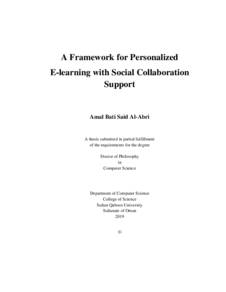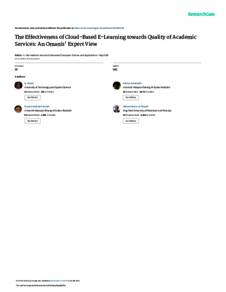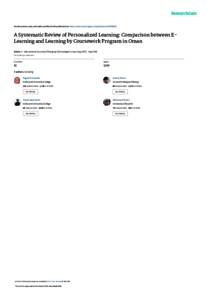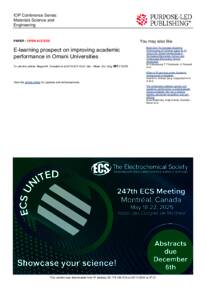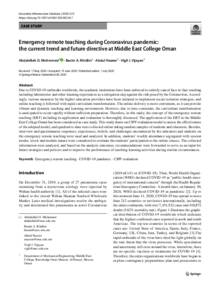Document
A Framework for personalized E-learning with social collaboration support.
Publisher
Sultan Qaboos University.
Gregorian
2019
Language
English
English abstract
The emergence of social media sources has considerably enhanced interaction and
collaboration support in the education field. The integration of such sources can equip
learners with channels and skills to acquire knowledge through sharing of information,
resources, ideas, as well as expressing opinions and comments during the interactions. The
generated contents during interaction support learners' understanding and learning
concepts and this consequently can guide the delivery of personalized learning experience.
However, the utilization of these contents in the current e-learning systems seems
inevitably limited. Besides, the interaction is unreasonable.
The aim of this research is to highlight and address the issue of limited interaction by
opening new space for more participants in addition to the peers and course teacher.
Furthermore, analyzing the generated data during group discussion and social collaboration
has helped to understand the learning concept and learner's characteristics to provide a
personalized learning feature. The research is proposing a framework for personalized elearning with social collaboration support. The framework will be divided into two
techniques namely, adaptive learning and collaborative learning through the use of social
media sources. The framework is meant to provide value-added services for both students
and teachers through an aggregation of information, resources, services and people. This
thesis employs different mining and modeling techniques to extract the required
information about learner's characteristics and learning concepts. The characteristics
targeted in this work are knowledge level, preferences, learning style and social grouping.
The knowledge level is measured on the basis of the richness of the shared messages in
relation to the learning concept. The learning style is identified based on the preferable
learning objects and modeled using Felder-Silverman Learning Style. The identification of
learning style has guided the social grouping of the learners based on social interaction.
The knowledge level and social grouping direct the delivery of the personalized learning
path.
The evaluation of the proposed framework targeted Omani learners by considering two
educational government institutions in the Sultanate of Oman (Sultan Qaboos University
and Ibri College of Technology). The evaluation has been carried out in the form of a case
study and interview resulted in an indication of the enrichment of the contents generated
during social collaborations. The valuable information included in the extracted content
was very useful in understanding the different characteristics of the learners as well as
constructing the domain model. This is an indication of a promising further prospective in
the utilization of generated data during collaboration activity especially for the delivery of
personalization features
Member of
Resource URL
Arabic abstract
نظرا لدخول وسائل التواصل الاجتماعي ومصادرها المختلفة وأشكالها وأغراضها المتعددة إلى عالمنا من أوسع أبوابه، فقد تعززت الجوانب التفاعلية والتعاونية لالرتقاء بالمستوى التعليمي، حيث عملت هذه المصادر على تكامل المنظومة التعليمية بغرض تزويد الدارسين بالاوعية والادوات السليمة الكتساب المعرفة والخبرة عن طريق تبادل المعلومات والمصادر والافكار والاراء والمالحظات المختلفة باستخدام التفاعالت المتبادلة. وتساعد المحتويات التعليمية الناتجة خالل هذه التفاعالت على فهم خصائص المتعلمين والمفاهيم التي ينبغي عليهم تعلمها واكتسابها، مما يعطينا القدرة على توجيه تعليمهم الشخصي بنا ًء على هذه الخصائص والسمات. الا أن العملية التفاعلية في أنظمة التعليم الالكترونية الحالية متوفرة لألسف بشكل محدود وضئيل جدا، وما تزال غير مسخرة لدعم التعلم الشخصي. يهدف هذا البحث إلى معالجة مشكلة محدودية بيئة التفاعل الالكترونية من خالل فتح المجال أمام المزيد من التطبيقات الفعالة التي تحفز مشاركة أفرادمن خارج هذه البيئة إضافة للزمالء والاساتذة لتعّرف هذه التطبيقات والتعمق في تفعيلها. كما يهدف البحث إلى تحليل البيانات والمعلومات الناتجة من المناقشة الجماعية والتعاون الاجتماعي لتدعيم إدراك الطالب لمفاهيم التعلم وخصائص المتعلم بهدف تقديم خاصية التعلم الشخصي. ويسهم البحث في تقديم مقترح الاطار للتعلم الالكتروني الشخصي مدعوم بالتشارك الاجتماعي. ويعتمد عمل الاطار على منهجين، وهما: التعلم المبني على التكيف والتعلم المبني على التشارك باستخدام وسائل التواصل الاجتماعي. كما يُعنى الاطار بتوفير خدمات قيّمة للطلبة والاساتذة عبر مجموعة من المعلومات والمصادر المختلفة والخدمات المتاحة والافراد. ويرتكز عمل هذه الاطروحة على استخدام تقنيات مختلفة لتأطير منهجية البحث واستخراج المعلومات المطلوبة والتي تتعلق بخصـــائص المتعلم ومفاهيم التــعلم. ولقد استهدف هذا البحث أربعة خصائص للمتعلمين، وهي: مستوى معرفتهم، وتفضيالتهم، ونمط ّم قياس مستوى المعرفة بنا ًء على ثراء مشاركات المتعلم من حيث عالقتها بالمفهوم تعلمهم، وفئتهم الاجتماعية. وت المطروح للمناقشة. في حين ت ل باستخدام ّم تحديد نمط التعلم ّ استنادًا إلى نوعية المادة التعليمية المف ّضلة لدى المتعلم وتمث نموذج فيلدر سيلفرمان حيث أدّت هذه الخصائص إلى إنشاء وتقديم حزمة التعلم الشخصية. بينما أدّى تحديد نمط التعلم إلى تصنيف المتعلمين حسب فئاتهم الاجتماعية المالئمة. ويبدو أن تقديم المسار التعليمي الشخصي يكون على أساس خاصيتين، وهما: المستوى المعرفي والفئة الاجتماعية. لقد استهدف تقييم الاطار المقترح في هذا البحث الطلبة العمانيين الجامعيين المنتسبين لكل من جامعة السلطان قابوس والكلية التقنية بعبري. وتشير نتائج التقييم إلى وجود محتويات ثرية وقيّمة تنتج من التواصل والتشارك الاجتماعي. وتُعد المعلومات المخفية التي تم استنتاجها من المحتوى قيّمة ومفيدة جدا لفهم الخصائص والسمات المختلفة للطلبة المتعلمين وكذلك لبناء نموذج المجال التعليمي. وتؤكد النتائج على وجود فرصة مستقبلية واعدة للاستفادة من البيانات والمحتويات التي تم إنشاؤها أثناء أنشطة التشارك خاصة من أجل تقديم ميزة التخصيص.
Category
Theses and Dissertations

